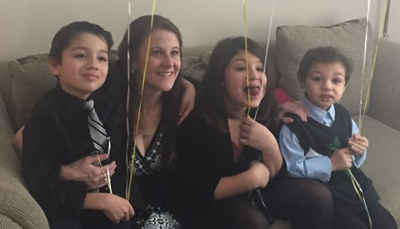Educator Provides Permanency to Student Sibling Set
Rebecca Nallon, Northeast Regional Technical Assistant
It takes a village to raise a child, as the saying goes, and in the best-case scenarios, children and youth who seek permanency resources need look no further than their own village. Debbie Hiller represents a unique subset of this village: teachers and educational professionals. Recently, Ms. Hiller took some time to talk about the experience and process of adopting her three children.
The Hiller family was one of several families recognized at the 2019 Pennsylvania Statewide Adoption and Permanency Network (SWAN)/Independent Living Permanency Conference. The Hillers were nominated for their award by Susan Bubb of Diakon Adoption and Foster Care. According to Ms. Bubb, Debbie Hiller met her daughter, Isabella, when she was a second grade student in her classroom. Ms. Hiller quickly fell in love with the beautiful child and recognized within herself the ability to provide love, care and permanency when she learned of the girl’s involvement in the child welfare system.
Ms. Hiller soon discovered that Isabella wasn’t alone in her need, with two younger brothers in tow. Without hesitation, Ms. Hiller sought to provide the home the young siblings needed. For 19 months, Ms. Hiller poured her love and devotion into the children’s lives, focusing on meeting each of their challenges and needs individually and creatively, pushing aside critics and naysayers with her continuous spirit of advocacy, acceptance, and hope for the children’s brighter future. On February 11, 2019, Isabella, Jordan, and Noah were adopted into Ms. Hiller’s family permanently. The children know that, whatever storms life may bring, they have an anchor in their new mother, a place to always call home, and an unending commitment to faithfully love and support one another for the rest of their lives.
Here is what the family had to say:
Q: Congratulations on your permanency award. What motivated you to make the transition from educator to parent?
A: I wanted to help kids at risk who were struggling. It was my daughter who really encouraged me. She said, “Why don’t you come visit?” So I did. We visited once a week at first and it went from there. It was like falling in love.
Q: What was your biggest barrier along this journey, and how did you overcome it?
A: It was hard realizing the level of loss and heartache that they came with. It’s like the Taylor Swift song that says, “Band-Aids don’t fix bullet holes.” The wound still hurts, and every day you have to tend to it. It was surprising and more difficult than I expected; being in a safe and loving home for a year or two didn’t heal the wounds. At first I was very independent, but I have learned to reach out for help now. Their wounds made me have to reach out, and I have come to embrace the concept “it takes a village.” Sometimes other people have the ability to meet a need I can’t.
Q: What is your greatest joy in parenting your children?
A: It is the playfulness they bring to everything we do—the sheer joy they have when they wake up. Every day is a new page. The small moments from each day are the greatest things. We get so excited about taking tubes into the swimming pool and going roller skating.
Q: Have you had the opportunity to meet any other educators who have adopted children they first met as students? How do you feel stories like yours have impacted the education community?
A: One of my mentor teachers had adopted as well, after her kids were raised. She provided me with beautiful guidance. Colleagues have turned into lifelines and friends. Three of my colleagues have begun to seriously consider adopting. It opens up a dialogue. We talk about how the process was strangely difficult but smooth. I had to wait sometimes, but it wasn’t like prying open a door. My relationship with my colleagues is more transparent now, and I can help them not to feel afraid of the process.
Q: What advice do you have for educational professionals who are open to being resources for children in foster care that they may know?
A: Open your heart, mind, and home to the possibility. Absolutely, absolutely do it. If your heart is interested, you are saying, “I’m open and available.” You don’t have to be afraid; embrace your journey. I never thought a single woman with my salary would be able to adopt three kids. Every barrier worked out step-by-step. Do it: form a relationship. If you don’t end up adopting, that’s okay too. You’ve made a connection. Children just need to be seen on a regular basis. When you visit, you can feel the energy. Follow your heart and don’t think too much about it.
Individuals wishing to become resource parents can learn more at adoptpakids.org or by calling the SWAN Helpline at 1-800-585-7926.
